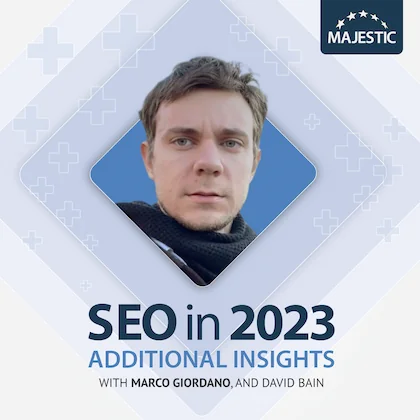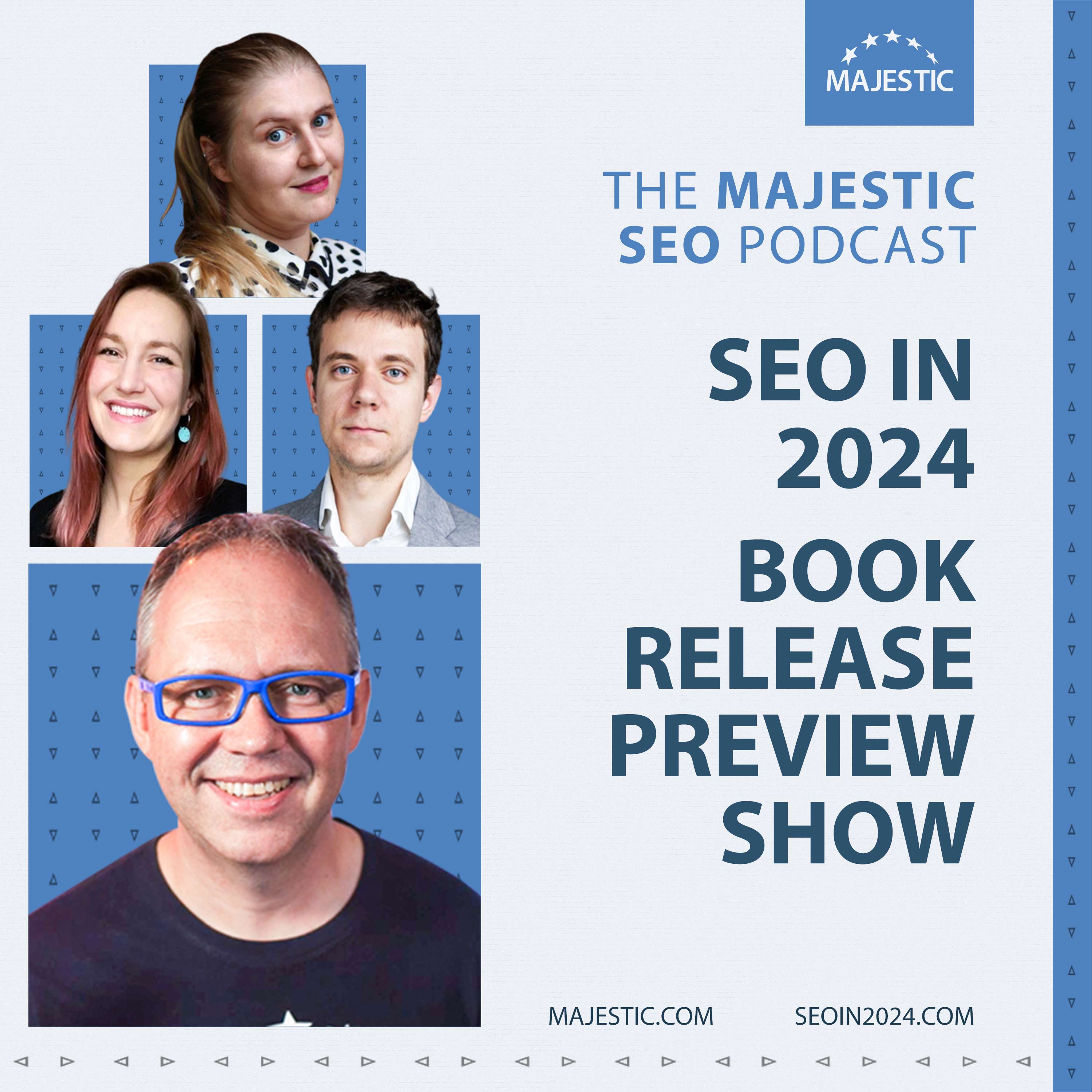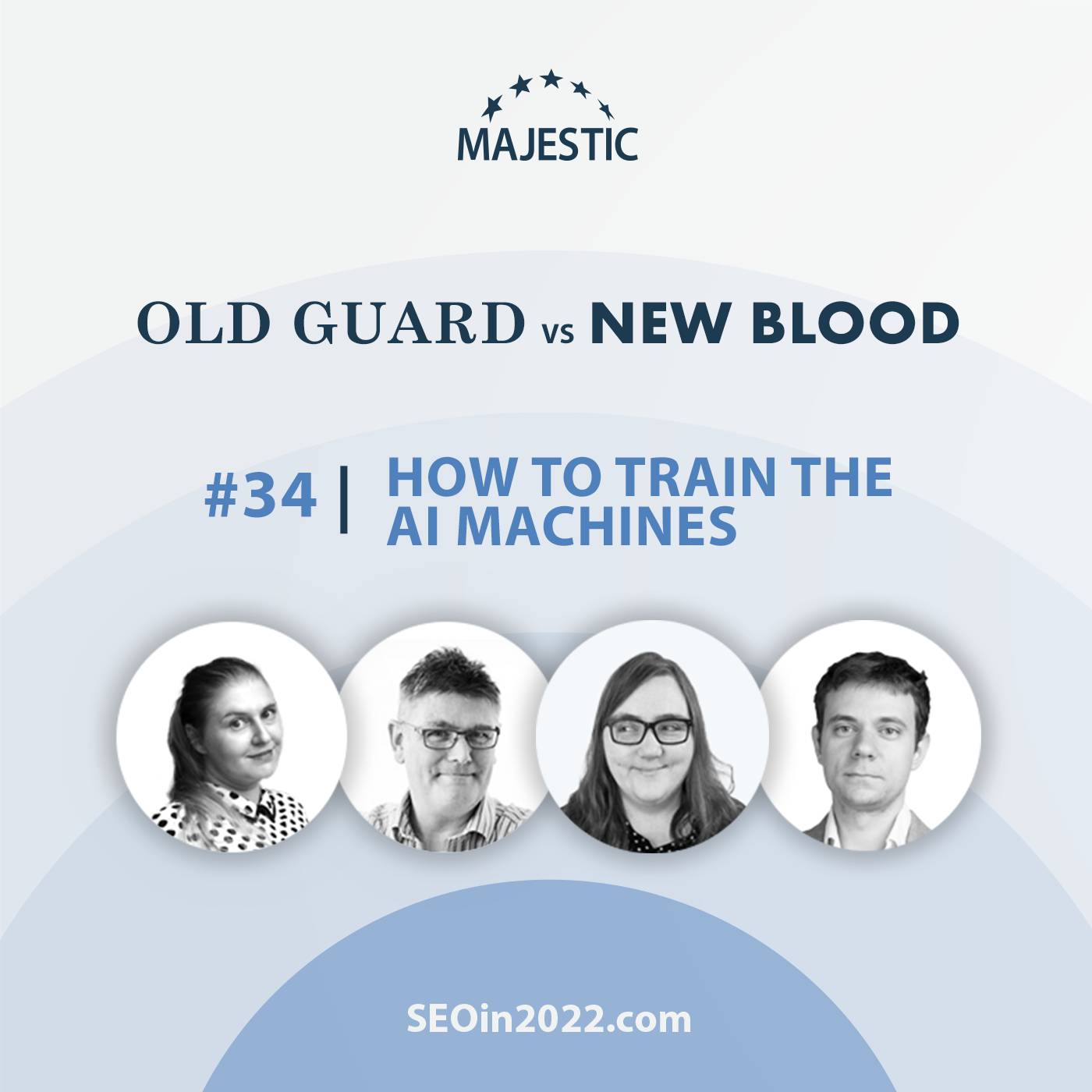-
Site Explorer
- Majestic
- Summary
- Ref Domains
- Backlinks
 New
New Lost
Lost- Context
- Anchor Text
- Pages
- Topics
- Link Graph
- Related Sites
- Advanced Tools
- Author ExplorerBeta
- Summary
- Similar Profiles
- Profile Backlinks
- Attributions
- Compare
-
Link Tools
- My Majestic
- Recent Activity
- Reports
- Campaigns
- Verified Domains
- OpenApps
- API Keys
- Keywords
- Keyword Generator
- Keyword Checker
- Search Explorer
- Link Tools
- Bulk Backlinks
- Neighbourhood Checker
- Submit URLs
- Experimental
- Index Merger
- Link Profile Fight
- Mutual Links
- Solo Links
- PDF Report
- Typo Domain
- Free SEO Tools
- Support
Review your current processes and cut out unnecessary tools or modules
Marco Giordano
Marco Giordano recommends reviewing your current processes for 2023, and to cut out unnecessary tools or processes that may be negatively affecting your website or agency.

Marco Giordano says: “My tip for 2023 is basically cutting costs and unnecessary processes that may affect your website or your agency. I usually notice that a lot of them, especially enterprise websites, and so on, are based on a stack that doesn't have synergy, or just, you know, a sum of tools. For instance, if you're not spending much time for some technical tasks, it's unnecessary to pay or to spend more time in terms of opportunity on some activities. So, it's more in terms of efficiency. Another example I noticed is that for some websites, if you have a small portfolio, or even if you're an agency, and maybe technical SEO isn't your focus, or it is your focus, but not in a predominant way, you can even cut more on some of these tasks that do not add value. Example, fixing meta descriptions, it's one of these cases where there isn't almost no additional value for a lot of websites. And instead, investing more time into those activities, where the ROI or the value for the client, for the customer or even your website is higher, for instance, labeling your data. Or another example is, where you have to produce a dashboard, or something, a lot of people try to spend a lot of resources into these tools that help you gather some data. And maybe you don't need this data, because it’s hard to interpret for your client.”
So you started off by talking about the importance of reducing costs and cutting processes. And I was going to ask you about your specific examples of that. You did actually touch on meta descriptions. So why are meta descriptions not an efficient use of time at the moment? And what's an example of another process that perhaps costs too much, and that should be cut?
“Okay, so for meta descriptions, the problem is that, normally, I think it's one of those elements you can generate. I agree on generation for these elements, because they are not ranking factors. And for the user, a short description is usually fine. If you have a meta description generated by a machine, usually, it's okay. You're not going to do any damage on average. So, it's a risk you can take and you don't need to waste much time. Another example of overrated, overpriced task, I think is also doing audits. I love audits, I do a lot of them. But my main issue is that in some cases, you don't really need to do an audit every month, or every two months. Because if you can’t take an action, if you can’t do anything, based on those audits, then they're useless. It just a list of facts or interesting trivia that you're not using. And I learned a lot about these cases from some people that contacted me, where they have like six audits from different agencies, or different service providers. But they still get no results. And I don't blame the audits. I blame the mindset because you should take action. And this is one example of where it's overpriced, you're paying for something that you are not using. If you have six audits, I think you're already going overboard, you should stop and start practicing. Start doing what they say, implement the changes.”
Just majoring on meta descriptions just for one more second. That's not part of an algorithm but it does impact click through rate. So, is it not important because it impacts click through rate, and is optimizing that not something that will potentially get you significantly more traffic?
“Yes, I mean, of course, it impacts CTR, but for instance, Google can rewrite them. I usually work with content; I don't work with e-commerce. So, I talk about content websites, or focus just on B2C content. Usually, Google is rewriting all of my meta descriptions, like 80% of my meta descriptions of what they see online is rewritten. So, I write them every free time, because it takes 10 seconds. So I just do it. But it's not something so important I would do as the first task for a client, or getting paid for that stuff is something I will never do. And for my specific examples, so content websites, I hardly see my meta descriptions or any meta description, even for competitors getting picked, especially for listicles. You write the best meta description, and Google uses the items as the description. So you don't get the description. I usually rate 10 - item one, 9 - item two. So, it's quite a little bit discomforting, because it's not even a ranking factor. Okay, it impacts CTR. But if Google is going to write it anyway, I don't waste much time on it.”
And does a page title come under the same umbrella? Can we just automate the generation of a page title as well?
“Now, I'm a big fan of manual work for title tags, super big fan. I mean, that's the quickest way. Especially with product pages, even though I don't usually deal with them. But in my limited experience, I got some pages from position 90 to position 1, just because it was a super authoritative website, super important, and because the page title was totally off. So after some months or even weeks, after I changed the title, you'll see big bumps. And that's why I always do the page title manually. But you can also do it with some software, it's feasible, especially for ecommerce, even if I don't do it. I can tell someone to write, I don't know, 10,000 titles manually, but it's impossible. There are some apps or use cases, if you check Lee Foot, where you can just generate a title based on something you input, and it's quite reliable. But for content websites, usually, they already have good titles, because it's good practice, especially for publishers to use clickbait or to use some, you know, emotional words. So on average, they are good, but if you have a product, if you're an e-commerce, there are owners that just put the brand. Like if you're selling, Nike shoes 100, then the title tag is “Nike shoes 100”. Which is bad compared to what you can do.”
Beforehand you also mentioned that you've replaced Google Sheets with something called Airtable. Why have you done that? What productivity increases that given you?
“Okay, so the problem with spreadsheets is that they are spreadsheets, so they shouldn't be used for other tasks. Right? They are not databases, by definition, even though you got big companies or enterprises still using XML, or still storing data as CSV. So, it's not an SEO problem. It's in every part of the world, in every type of industry. It's quite common. Airtable is essentially a mix between spreadsheets, and databases. So, if you know nothing about databases, it's perfect. You're the target, you're a potential customer. And I use it because it's easier to automate tasks. I can set it up that when someone finishes an article, or when you take something, person X gets an email, or this happens, so via hooks. And it's actually easier because I can use this data. I mean, you can use these tables as a spreadsheet as a big spreadsheet, as a worksheet actually. And then you can also get Views. Views are like virtual tables that you can visualize with a click. So, for instance, let's say you have a spreadsheet where you have URL title, status, published draft, assigned, edited and so on. You can just create a Kanban which is called a View where you can just see the articles grouped by status, like they were cards. It's easier to skim and it's also good in terms of productivity, because I was working on some content websites and my editors told me: wow, this saves a lot of time, because it's actually faster to look for something, and the UI is actually even better. Plus they got automations, they got fast pivot tables. So, it's easier to see if you have clusters.
And another fact that is important is that you can use spreadsheets, even Google Sheets, whatever you want to label your articles. What I mean is that when you're dealing with a content audit, and you have a flat structure, which is often the case for what they do, like example.com/article9. It's flat, there is no hierarchy. You can have enough time to classify your articles, to say this article belong to this group because you have nothing in the URL. So, you have to set up rules, like a RegEx, you have to select some criteria. But since I don't like it, because it's prone to error, and can be quite annoying for larger websites, I recommend to label this data, like a URL title, you have this row where you have URL, title, status, comments, whatever. And then you have another column, where you can just pick a category. So the cluster, the article, or the clusters it belongs to. So, once you have this file, you can export it, merge it with Search Console, or Analytics, or you can group by cluster, and you can measure clicks or queries by group instead. So, this is a smarter approach. Because if you get the overview of a website, it doesn't mean anything. Like, who cares about the CTR of the entire website, it's not actionable. But if you have groups, if you do this process, it saves you time. Okay, maybe a little bit more expensive. It depends on your team. But anyway, it saves you time. And you also get more insight if you're smart about it, if you can pull off the right automation.”
You've mentioned labeling a couple of times. You started off by talking about labeling your data, and I was going to go back to that, but you re-emphasized that then and I think that, you know, certainly for larger websites, it's key, because you probably will lose track on different pages, different blog posts that are ranking for related keyword terms. And perhaps you're sabotaging your efforts because you're getting a blog post that may not convert ranking for a competitive keyword term, when if you clustered your opportunities effectively, then perhaps you'll give yourself the opportunity to rank that higher converting page for that term. Is that the kind of benefit that you're thinking of from labeling?
“Yes. And also, I mean, it depends on the perspective, if it is your website, of course, it's your own benefit, but for a client as well, because it doesn't make any sense to audit a publisher, because publishers usually talk about every possible topic in the existence. And compare, I don't know, lifestyle to tech or another totally different topic. Because they have different competition, different profitability. They may even have different audience. So it only makes sense to label them and to separate them. also for Google, in terms of topicality. Because, of course, if I have a cluster of articles, and they are quite close, and they got penalized, something happened. But if you don't cluster, if you don't do this process of labeling your data or you know, reasoning by sections, then you don't know where it happened. You just know it happened. But you don't know how to pinpoint it. You know, okay, something happened, but where? So it's very simple, actually. It's basic, you can say data analysis. It's not impossible. But it's so simple that it's not a frequent topic. Because usually for content audits you don’t read this stuff you usually read the basic stuff like check clicks, check impressions, check Google Analytics, but for instance, I don't even check Analytics. Usually, I just use SERP data or Search Console or Screaming Frog.”
So you shared that SEOs should be doing in 2023. Now let's talk about what SEO shouldn't be doing. So, what's something that's seductive in terms of time, but ultimately counterproductive? What's something that SEO shouldn't be doing in 2023?
“Okay, so if you mean in general, I think shiny tools, but that goes for every year. I mean, if you ask me next year, will say the same thing.”
What's an example of a shiny tool?
“Okay, for instance, ChatGPT. I mean, it's a powerful tool. I use it every day for coding, because I'm lazy. I don't want to use my brain for operations, because the tool can do it for me. And it's often better than what I can produce, I would say. But in terms of, you know, impact on the industry, I think that it's overrated for one reason, because Open AI already had these tasks. So many of us were already using those tasks that you can also do with ChatGPT. The model is better, of course, I mean, and there is better marketing. It's more about the brand now. But of course, it's my opinion, it's nothing innovative, especially for some websites. Of course, if you're an eCcommerce, or one of those websites, the potential for me is higher, because there is more room for automation, way more room for automation. But if you're doing b2b, any b2b, like what's the value of using AI compared to b2c? Because in some niches, you can generate documentation with AI, it's perfectly fine. No one complains and it makes sense for the user because some content cannot be done by humans, like programmatic content. You shouldn't do manually, because of course, it's impossible. But if you consider b2b, where the b2b is also harder for me compared to b2c, where the content is boring by default, as many b2b marketers say. I don't think that AI is going to make you rich, because you need unique research, a unique angle, point of view, compared to competitors, especially in the English markets competition is tougher, it's way harder. So, you're not going to compete with copied pages. Let's speak about b2b SaaS, one of the most competitive markets out there. I mean, even if you look for super niche keywords, you will find Shopify, Capterra, or someone else ranking for them. So I'm quite sure that even if you put AI content to scale, you are not going to beat them in terms of trust, and brand. So why ChatGPT is good? I think you should use it for some tasks, especially if you're into coding. If you want to cluster something and you don't want to code, ChatGPT is a very good ally. A lot of use cases, a lot of them. But for content generation, especially for b2b or thought leadership, please don't.”
He said, b2b content is boring by default. You could say, Marco, this is a piece of b2b content, an SEO podcast, surely this isn't boring.
“Okay. Marketing is interesting. But let's say if you're talking about I don't know, construction, like concrete, it's hard to make an article about concrete engineering interesting. It's very hard.”
If you don't want to work in industry, if you're not passionate about it, yes.
“Yeah. But even so, because engineers, these people may expect, you know, a very professional and cold language. If you get something wrong, your company may get sued. Like if you say durable, how much durable, what do you mean by durable? Do you have a number to quantify durable? It's not so easy.”
And that's a conversation that we can probably carry on having in another episode, hopefully, in the future. But at the moment, I'm just going to say that Marco Giordano is a freelance SEO and search engine optimization specialist and web analyst at Seeker. You can also find them at seeker.com and on LinkedIn and Twitter.
Also with Marco Giordano
Choose Your Own Learning Style
 Video
Video
If you like to get up-close with your favourite SEO experts, these one-to-one interviews might just be for you.
Watch all of our episodes, FREE, on our dedicated SEO in 2023: Additional Insights playlist.
 Podcast
Podcast
Maybe you are more of a listener than a watcher, or prefer to learn while you commute.
SEO in 2023: Additional Insights is available now via all the usual podcast platforms
 SEO in 2023
SEO in 2023
Catch up on SEO tips from 101 SEO experts in the original SEO in 2023 series
Available as a video series, podcast, and a book.
Could we improve this page for you? Please tell us








